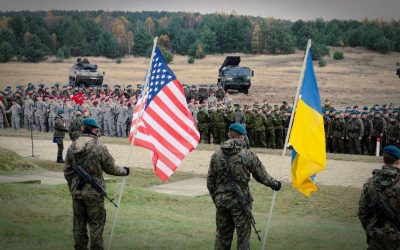Chinese Viewpoint: Washington’s Ukraine Policy Driven by Domestic Politics, Desire to Dominate Europe

All Global Research articles can be read in 51 languages by activating the “Translate Website” drop down menu on the top banner of our home page (Desktop version).
To receive Global Research’s Daily Newsletter (selected articles), click here.
Visit and follow us on Instagram at @globalresearch_crg.
***
It goes without saying that the current crisis, the manifestation (perhaps the culmination) of decades-old geopolitical plans, may in part be attributable to the causes identified below; but the strategy has been the same, with perhaps to some extent a brief four-year hiatus (in degree if not in essence), since the breakup of the Soviet Union.
Notwithstanding which, Joe Biden is the most fervently Atlanticist, pro-NATO expansion president in U.S. history, with an unbroken fifty-year history of being in the forefront of advocating for the NATO agenda.
*
World Insights: Why U.S. keeps stoking Russia-Ukraine tensions
By Xinhua writers Deng Xianlai, Zhang Yisheng and Feng Yasong
Edited for relevance
U.S. and Russian diplomats on Monday had a heated debate at the United Nations Security Council over the Ukraine crisis, with the U.S. side blaming Russia for intending to invade Ukraine and Russian diplomats accusing Washington of “whipping up tensions” over the current crisis.
Analysts said that the current U.S. administration has reasons to keep fueling the already-strained Russia-Ukraine tensions: one is to use the crisis to divert domestic attention and build momentum for the upcoming mid-term elections; the other is to revive its influence over Europe by uniting its European allies against Russia.
U.S. Toolkit
Experts said the U.S. administration has taken three major moves over the crisis on the Ukrainian border.
The first is to exaggerate an imminent Russian “attack” on Ukraine by disclosing relevant “intelligence” obtained by the U.S. and its allies, revealing so-called “evidence” of Russia’s continued destabilization of Ukraine, and ordering the departure of U.S. staff at its embassy in Ukraine.
The second is to beef up the threat of economic sanctions against Russia….
The third is to strengthen military deployment within the North Atlantic Treaty Organization (NATO), while assisting Ukraine without directly sending troops to the country. Several shipments of weapons have been sent to Ukraine and more military and economic aid has been promised by the United States.
U.S. Motivation
Analysts said that Washington’s overblown description of a looming war relates to its own domestic and diplomatic concerns.
On the domestic front, the current administration’s move on the Ukraine crisis could show its toughness in foreign policy, over which Republicans have been keen to accuse U.S. President Joe Biden of being weak.
As Biden’s approval ratings are at a low point, local media said that his hawkish attitude toward Russia is likely to gain more votes in the November mid-term elections.
Diplomatically, the Biden administration could use the Russia-Ukraine tensions to further pressure Moscow, and consequently to woo and unite European allies to take a tougher stance against Russia.
Given that the U.S. international image has been tarnished by its hasty withdrawal from Afghanistan last year, the Ukraine crisis would be a chance for the Biden administration to show off its leadership in the West.
However, foreign policy is not a top priority in the U.S. election campaign at this stage. Americans, instead, are more concerned about the economy, the pandemic and other issues closer to their personal lives. In addition, many European countries, which rely on Russia for energy, do not want to escalate the tensions and do not want to be bound by the U.S. policy towards Russia, experts have said.
*
Note to readers: Please click the share buttons above or below. Follow us on Instagram, @globalresearch_crg. Forward this article to your email lists. Crosspost on your blog site, internet forums. etc.
Rick Rozoff, renowned author and geopolitical analyst, actively involved in opposing war, militarism and interventionism for over fifty years. He manages the Anti-Bellum and For peace, against war website.
He is a Research Associate of the Centre for Research on Globalization (CRG).
Featured image is from Donbass Insider

